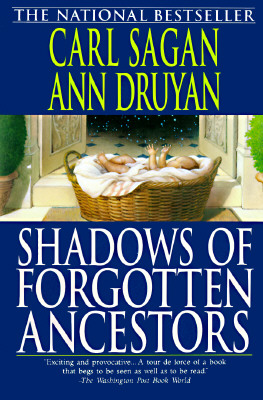

| SHADOWS OF FORGOTTEN ANCESTORS: A Search for Who We Are Carl Sagan & Ann Druyan New York: Random House, 1992 |
Rating: 5.0 High |
|||
| ISBN-13 978-0-394-53481-7 | ||||
| ISBN 0-394-53481-6 | 505pp. | HC | $23.00 | |
"Cold; a fire: Good! Who?"
The above is a quote1 found on Usenet, and intended as humor. However, it turns out to be unexpectedly appropriate; for this book begins by showing us the vast, cold blackness of space, broken only here and there by the fires of a sun.
It then summarizes what we know of the evolution of our planet, and of its abundant life forms. These, despite their incredible variation, almost all depend on the molecule called DNA (deoxyribonucleic acid) for the patterns by which they are developed. We can use the structure of DNA as a measure of relatedness between species. Chimpanzees and humans, for example, have DNA patterns that (in their "active" portions) are 99.6% identical.
But Sagan and Druyan are more concerned with behaviors and what these reveal about the inner nature of man and his nearest relatives. Citing dozens of recent studies — and, for contrast, the writings of wise men from Aeschylus to Zuckerman — they develop the proposition that humanity differs from the other primates only in degrees, not in kinds, of traits and abilities. This is still heresy to many; but the evidence makes it hard to deny. As Shakespeare said, "This were sometimes a paradox; but the time hath given it proof."
The book, in my opinion, is a little longer than it needs to be. Reading it, I sometimes had the feeling of repeatedly going over the same ground. Also, the early chapters are not necessary to the central thesis. Still, the authors write with accuracy and grace, and their narrative is nowhere heavy going. And I have come to believe that only by accepting the idea that we are brothers to the beasts will we be able to continue becoming more like unto the angels.
As for errors, I am aware of only one, and that looks like the fault of an editor or proofreader. On pages 312-313, I find a sentence containing this phrase: "The combination of dominant males, submissive females, differential but scheming subordinates..." Here, "deferential" is clearly the word intended.
There are places where I would have inserted a comma after a phrase; but most are more a matter of <ahem> differential styles than of outright errors. However, one definitely is an error. It occurs on page 85, ironically, where the authors speak of errors in books: "(It is unheard of that a book of this size, containing around a million letters would have no typographical errors..." A comma should come after "letters".

 To contact Chris Winter, send email to this address.
To contact Chris Winter, send email to this address.